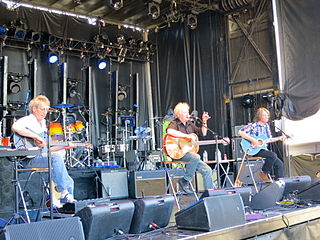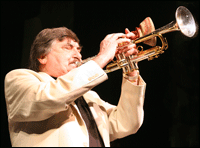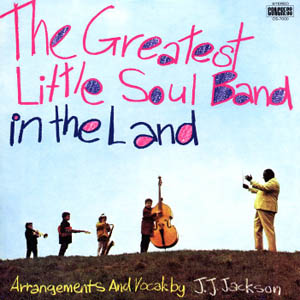
On Through the Night is the debut studio album by the English rock band Def Leppard, released on 14 March 1980. The album was produced by Tom Allom. It charted at No. 15 on the UK Albums Chart and No. 51 on the Billboard 200. The album features re-recorded versions of "Rocks Off" and "Overture", tracks from the band's original independently released EP, The Def Leppard E.P.. Other tracks are re-recorded versions of early demos, some of which later appeared on the 2020 box set The Early Years 79–81. The album was certified gold by the RIAA on 18 November 1983 and platinum on 9 May 1989.

Richard Parry is an English saxophonist. He has appeared as a session musician on various albums, most notably in solo parts on the Pink Floyd songs "Money", "Us and Them", "Shine On You Crazy Diamond" and "Wearing the Inside Out". He also played on the Bloodstone album Riddle of the Sphinx.

The Strawbs are an English rock band founded in 1964 as the Strawberry Hill Boys. The band started out as a bluegrass group, but eventually moved on to other styles such as folk rock and progressive rock.

Kenneth Daniel Ball was an English jazz musician, best known as the bandleader, lead trumpet player and vocalist in Kenny Ball and his Jazzmen.
The Monks were a British pop punk/new wave band, formed in the late 1970s by three former members of Strawbs—Richard Hudson (guitar), John Ford and Brian Willoughby—along with Terry Cassidy and Clive Pierce (drums).
John Ford is a British musician. He relocated to the United States in the mid-1980s and now resides on the North Shore of Long Island, New York.

Eugene McDuffy, known professionally as "Brother" Jack McDuff or "Captain" Jack McDuff, was an American jazz organist and organ trio bandleader who was most prominent during the hard bop and soul jazz era of the 1960s, often performing with an organ trio. He is also credited with giving guitarist George Benson his first break.

If was a British progressive rock and jazz rock band formed in 1969. In the period spanning 1970–75, they released eight studio-recorded albums and undertook 17 tours of Europe, the US and Canada. The band were acclaimed by George Knemeyer in a Billboard concert review as "unquestionably the best of the so-called jazz-rock bands".
Hudson Ford were a UK rock band-style duo, formed when John Ford and Richard Hudson left Strawbs in 1973. The original line-up featured Hudson and Ford along with Chris Parren on keyboards, Mickey Keen on guitars, and Gerry Conway on drums. Conway left in May 1974 prior to the recording of Free Spirit and was replaced by Ken Laws. Mickey Keen left the band in December 1974 and was replaced briefly by Mick Clarke, formerly of The Roy Young Band. Clarke moved to the United States in 1975 and was not replaced. The line-up remained stable from that point until the group dissolved in late 1977.

Terence Smith is a British jazz guitarist.
Jerome Louis "J.J." Jackson is an American soul/R&B singer, songwriter, and arranger. His singing style is as a belter. Jackson best known for the song "But It's Alright", which he co-wrote with Pierre Tubbs. The song was released in 1966 and then re-released in 1969, to chart success on both occasions. The liner notes to his 1967 album, J.J. Jackson, on Calla Records, stated that he weighed 285 pounds.
Matthew Gerrard is a Canadian record producer and songwriter.

The Greatest Little Soul Band in the Land is J.J. Jackson's third album. The album was released in 1969 on the Congress label, which had been relaunched that year by MCA as a subsidiary of Uni Records. The single released from the album was "Fat, Black and Together", which was co-written by Jackson and Al Stewart. One reviewer described the single as" a truly heavyweight funk jam that is the highlight of this gritty, soulful LP".

J.J. Jackson's Dilemma is the fourth album by J. J. Jackson and his second recorded in the UK.

To Seek a New Home is an album by American organist Brother Jack McDuff recorded in England in 1970 and released on the Blue Note label.

Getting Our Thing Together is a 1968 album by organist Brother Jack McDuff which was his second release on the Cadet label.
Lewis Futterman is an American record producer and manager, who was most active in the 1960s to the early 1980s. Commencing as of 1977, he has increasingly been involved in real estate development, primarily in New York City.

But It's Alright is the first album by J. J. Jackson, released on Calla Records in 1967.

The Great J. J. Jackson is the second album released by J. J. Jackson. The album was released in 1969 on Warner Bros. Records.













